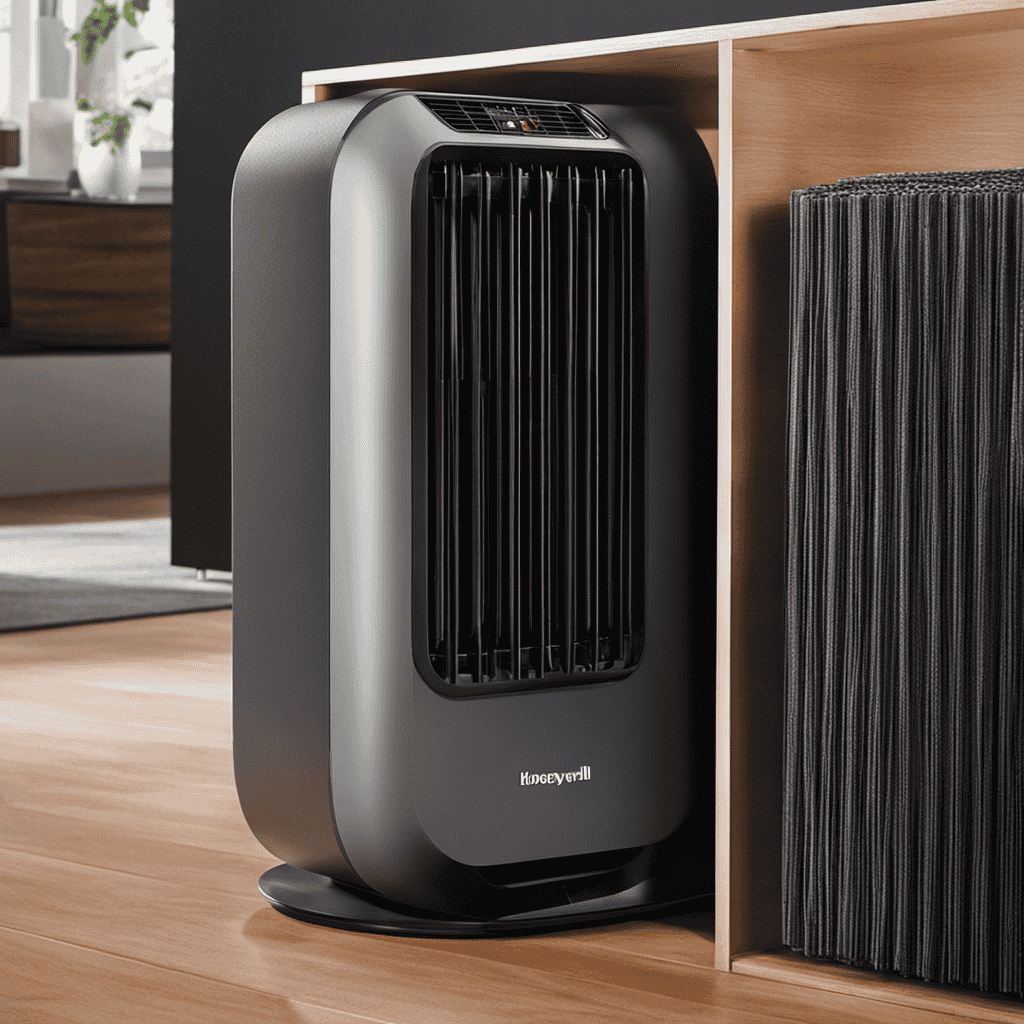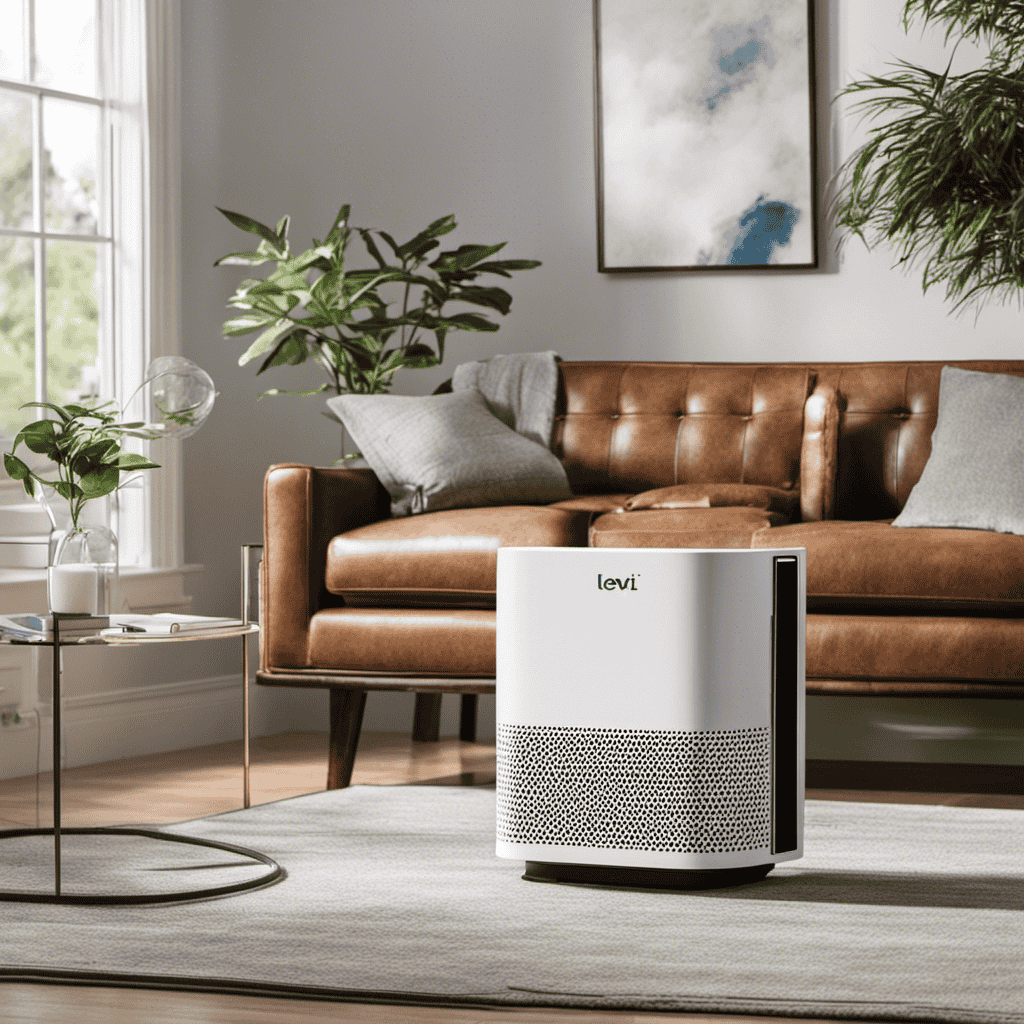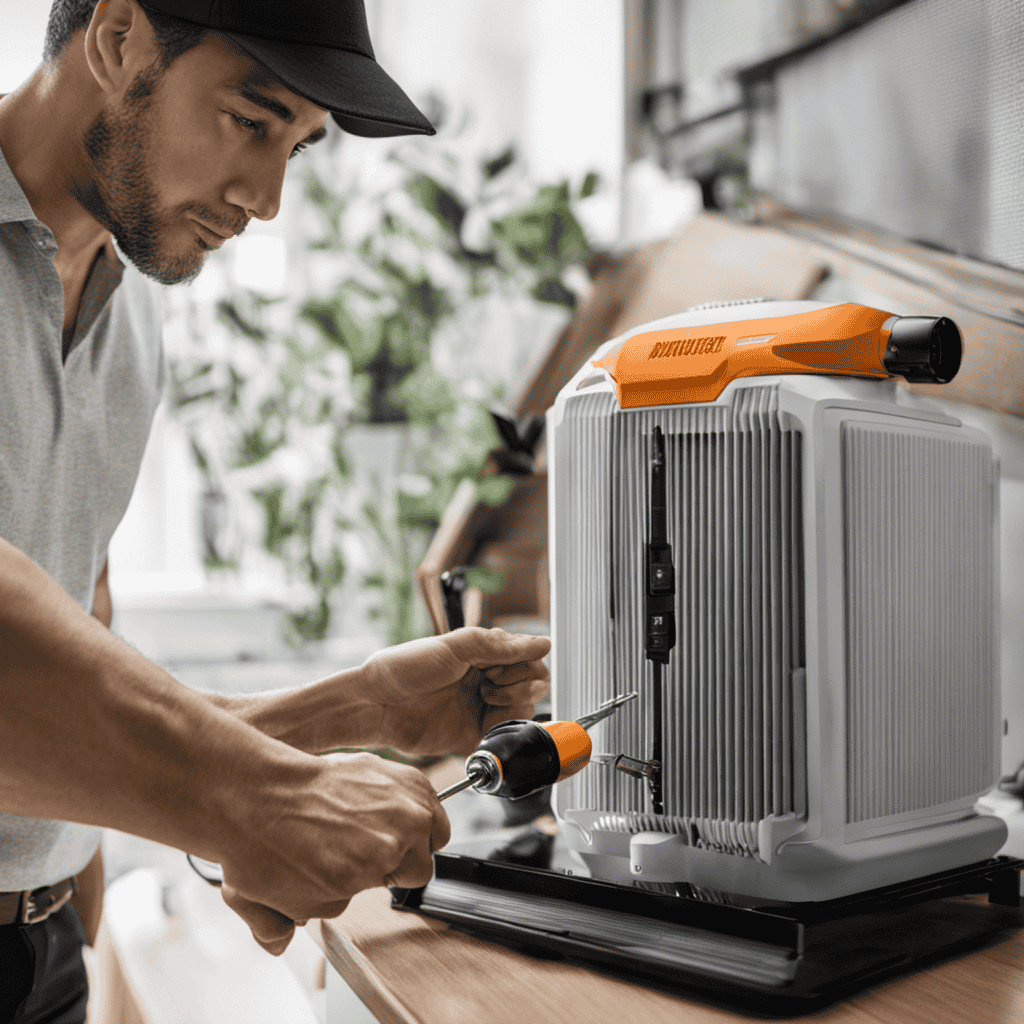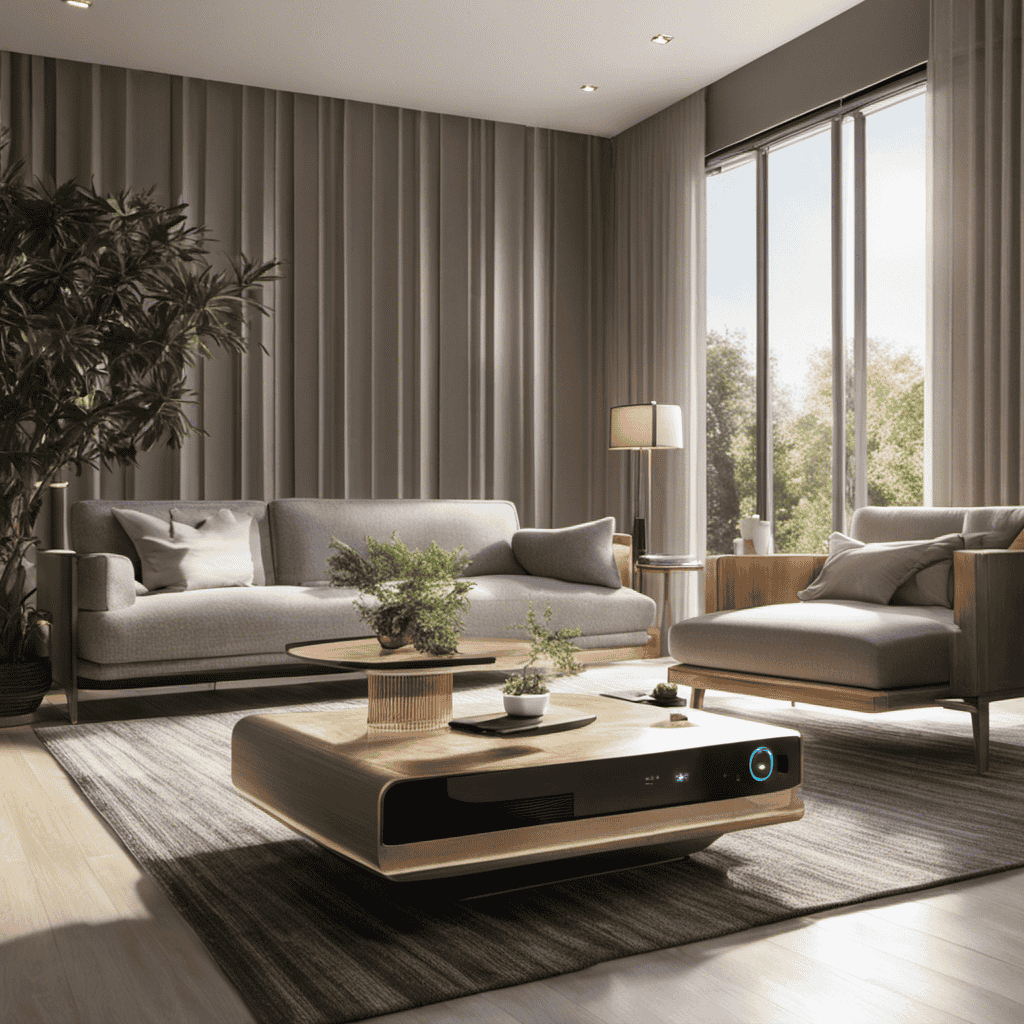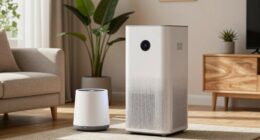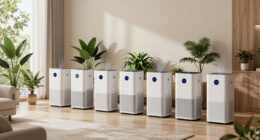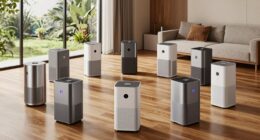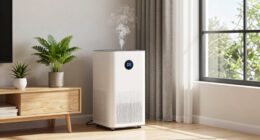As someone who is passionate about air purification, I have frequently pondered, ‘What filters are necessary for my Honeywell Air Purifier?’ But fear not! In this insightful article, we will discuss the significance of using the correct air purifier filters and examine the various filter options for Honeywell Air Purifiers.
We’ll also discuss how to choose the right filter for your specific model and when it’s time for a replacement. Plus, we’ll uncover the benefits of HEPA filters and the role of pre-filters in maintaining clean air.
Get ready to breathe easy with your Honeywell Air Purifier!
Key Takeaways
- Proper air purifier filters are crucial for maintaining clean indoor air quality.
- Different filter types for Honeywell air purifiers include pre-filter, HEPA filter, carbon filter, and UV-C filter.
- Choosing the right filter for your specific air purifier model involves considering the type of particles you want to remove.
- It is important to determine when it’s time to replace your air purifier filter based on lifespan indicators, air quality monitoring, and signs of filter degradation.
The Importance of Proper Air Purifier Filters
To ensure the effectiveness of your Honeywell air purifier, you’ll need to use proper filters.
Air purifier maintenance is crucial for maintaining clean and healthy indoor air quality. Using the right filters is essential to remove pollutants and allergens from the air, providing numerous benefits of clean air.
Proper filtration helps to capture and eliminate airborne particles, such as dust, pet dander, pollen, and mold spores, which can trigger allergies and respiratory issues. By removing these pollutants, air purifiers create a cleaner and healthier environment, reducing the risk of allergies and asthma attacks.
Additionally, clean air promotes better sleep, boosts productivity, and improves overall well-being.
Regularly replacing your Honeywell air purifier filters ensures optimal performance and maximizes the benefits of clean air in your home or office.
Understanding the Different Filter Types for Honeywell Air Purifiers
When choosing an air purifier, it’s important to understand the different types of filters available for your Honeywell device. Proper filter maintenance is crucial for optimal air purifier performance.
Here are three key types of filters to consider:
-
Pre-Filter: This initial line of defense captures larger particles like dust, pet hair, and lint. It helps prolong the lifespan of the main filter and improves overall air quality.
-
HEPA Filter: High-Efficiency Particulate Air (HEPA) filters are designed to trap tiny particles as small as 0.3 microns. They effectively capture allergens, pollen, mold spores, and even some bacteria, ensuring cleaner air for you and your family.
-
Carbon Filter: Equipped with an activated carbon layer, this filter excels at removing odors, smoke, and volatile organic compounds (VOCs). It eliminates unpleasant smells and harmful chemicals, leaving your home smelling fresh and clean.
Understanding these filter types will help you make an informed decision and maintain the performance of your Honeywell air purifier.
Choosing the Right Filter for Your Specific Air Purifier Model
Understanding the different filter options for your specific Honeywell air purifier model can help you select the right one for your needs. Proper filter maintenance is essential for optimal air purifier performance. Here is a table that outlines the various filter options available for Honeywell air purifiers:
| Filter Type | Description |
|---|---|
| Pre-Filter | Captures large particles such as dust and pet hair |
| HEPA Filter | Removes small particles like pollen and allergens |
| Carbon Filter | Eliminates odors and harmful gases |
| UV-C Filter | Destroys bacteria and viruses |
Regularly cleaning or replacing these filters ensures that your air purifier continues to effectively remove pollutants from the air, promoting a healthy indoor environment. Remember to consult your Honeywell air purifier’s user manual for specific filter maintenance instructions to maintain optimal air purifier performance.
How to Determine When It’s Time to Replace Your Air Purifier Filter
When it comes to maintaining optimal air quality in your home, it’s crucial to know when it’s time to replace your air purifier filter. Filter lifespan indicators are a helpful tool for keeping track of the filter’s performance and determining when a replacement is needed.
Signs of filter degradation, such as reduced air flow or an increase in dust and allergens, are also important cues to look out for.
Filter Lifespan Indicators
To determine when to replace your filters, check the lifespan indicators on your Honeywell air purifier. These indicators are designed to help you keep track of the filter’s lifespan and ensure that you are breathing in clean and fresh air. Here are three key filter lifespan indicators to look out for:
-
Filter Replacement Reminder: This indicator will alert you when it’s time to replace the filter. It takes into account the usage and the recommended lifespan of the filter, ensuring that you never miss a replacement.
-
Air Quality Monitor: Some Honeywell air purifiers come with an air quality monitor that continuously measures the air quality in your room. When the filter is nearing the end of its lifespan, the monitor will detect a decrease in air quality and notify you.
-
Filter Performance Indicator: This indicator shows the current performance of the filter. As the filter gets older, its efficiency may decrease, and the performance indicator will reflect this, giving you a clear indication that it’s time to replace the filter.
Signs of Filter Degradation
Check for signs such as a decrease in air quality and reduced filter performance to determine if your filters are degrading.
When it comes to filter replacement, there are a few common problems to look out for. One sign is a noticeable decline in the air quality in your space. If you start noticing more dust or unpleasant odors, it could be a sign that your filters are no longer effectively capturing pollutants.
Another sign is reduced filter performance. If you find that your filters are not removing as many particles from the air as they used to, it might be time to replace them.
Additionally, filters that are visibly dirty or damaged should also be replaced promptly.
Keeping an eye out for these signs will help ensure that your air purifier continues to provide clean and fresh air.
Exploring the Benefits of HEPA Filters in Honeywell Air Purifiers
When it comes to improving air quality and removing allergens and pollutants, HEPA filters are highly effective. These filters are designed to capture even the smallest particles, such as dust, pollen, pet dander, and mold spores, ensuring cleaner and healthier air in your home.
With a Honeywell air purifier equipped with a HEPA filter, you can breathe easier knowing that your indoor environment is free from harmful contaminants.
HEPA Filter Effectiveness
You should know that HEPA filters are highly effective at removing allergens and pollutants from your indoor air. These filters are designed to capture particles as small as 0.3 microns, which means they can trap tiny particles like dust mites, pollen, pet dander, and even some bacteria and viruses.
The benefits of HEPA filters are numerous:
- Improved air quality: With a HEPA filter, you can breathe easier knowing that the air you’re breathing is free from harmful particles.
- Allergy relief: HEPA filters can help alleviate allergy symptoms by removing the allergens that trigger them.
- Better respiratory health: By reducing the amount of pollutants in the air, HEPA filters can help improve your lung function and overall respiratory health.
To ensure the continued effectiveness of your HEPA filter, regular maintenance is key. This includes replacing the filter as recommended by the manufacturer and keeping the air purifier clean. By taking care of your HEPA filter, you can enjoy cleaner, healthier indoor air.
Improved Air Quality
To maintain improved air quality, it’s important to regularly clean and replace your HEPA filter as recommended. A clean air filter plays a crucial role in removing harmful pollutants from the air, ensuring that you and your family breathe in clean and healthy air. By filtering out particles such as dust, pollen, pet dander, and even some bacteria and viruses, a HEPA filter helps reduce allergies, asthma symptoms, and the spread of airborne illnesses. It also helps to eliminate unpleasant odors and smoke, creating a more pleasant living environment. Additionally, using an air purifier with a clean HEPA filter can contribute to air pollution solutions by reducing the number of pollutants released into the atmosphere. Enjoy the benefits of clean air by maintaining your HEPA filter regularly.
| Benefits of Clean Air | Air Pollution Solutions |
|---|---|
| Reduces allergies | Filters out pollutants |
| Improves respiratory health | Prevents the spread of airborne illnesses |
| Eliminates odors | Reduces indoor air pollution |
| Creates a pleasant living environment | Contributes to a cleaner atmosphere |
Allergen and Pollutant Removal
Regularly cleaning and replacing your HEPA filter helps ensure that harmful allergens and pollutants are effectively removed from the air you breathe. This simple maintenance task is crucial for maintaining the efficiency and effectiveness of your air purifier.
Here are three key reasons why you should prioritize air purifier maintenance:
-
Improved Health: Clean air is essential for our overall well-being. By removing allergens and pollutants, your air purifier helps reduce the risk of allergies, respiratory issues, and other health problems.
-
Enhanced Comfort: Breathing clean air can make a significant difference in how you feel. With an efficient air purifier, you can enjoy a fresher, more comfortable living environment.
-
Peace of Mind: Knowing that your air purifier is working optimally provides peace of mind. You can rest assured that you and your loved ones are breathing in clean, healthy air.
Regular maintenance of your air purifier not only ensures the benefits of clean air but also extends the lifespan of your device, saving you money in the long run.
The Role of Pre-Filters in Maintaining Clean Air in Your Home
If you want to maintain clean air in your home, it’s important to understand the role of pre-filters in your Honeywell air purifier.
Pre-filters play a crucial role in air purifier maintenance and ensuring the benefits of clean air. These filters are designed to capture larger particles such as dust, pet hair, and lint, preventing them from clogging the main HEPA filter.
By trapping these larger particles, pre-filters help to prolong the lifespan of the main filter, reducing the frequency of filter replacements and saving you money in the long run.
Additionally, pre-filters contribute to better overall air quality by removing visible contaminants and improving the efficiency of the air purifier.
To ensure optimal performance, it is important to regularly clean or replace the pre-filter, as well as follow proper maintenance and care tips for your Honeywell air purifier filters.
Tips for Proper Maintenance and Care of Your Honeywell Air Purifier Filters
One important tip for maintaining and caring for your Honeywell air purifier is to regularly check and clean the pre-filter. This helps to improve the overall efficiency of the device. Cleaning the pre-filter ensures that it can effectively capture larger particles like dust and pet hair. It also extends the lifespan of the main HEPA filter.
Here are some additional tips to keep your air purifier running smoothly:
- Change the HEPA filter every 6-12 months to maintain optimal performance.
- Vacuum or wipe down the exterior of the air purifier regularly to remove dust and dirt.
- Keep the air purifier in a well-ventilated area to allow for proper air circulation.
Frequently Asked Questions
How Often Should I Clean or Replace My Air Purifier Filter?
I typically clean or replace my air purifier filter every 3-6 months. To properly clean the filter, I gently vacuum or rinse it with water. Regular maintenance ensures optimal performance and cleaner air.
Can I Use a Non-Honeywell Filter in My Honeywell Air Purifier?
Yes, you can use a non-Honeywell filter in your Honeywell air purifier, but it is recommended to use Honeywell filters for optimal performance and to ensure compatibility. Honeywell filters are specifically designed for their air purifiers and provide the best filtration and air quality benefits.
Are There Any Filters That Can Help With Specific Airborne Allergens, Such as Pet Dander or Pollen?
When it comes to reducing indoor pollutants, air purifiers can be a game-changer. To choose the right one for your needs, consider filters that specifically target allergens like pet dander or pollen.
Is It Necessary to Use Both a Pre-Filter and a HEPA Filter in My Air Purifier?
Yes, it’s necessary to use both a pre-filter and a HEPA filter in your air purifier. The pre-filter helps capture larger particles, while the HEPA filter removes smaller particles, providing comprehensive filtration for better air quality.
Can I Wash and Reuse My Air Purifier Filter?
Yes, you can wash and reuse some air purifier filters. It’s a cost-effective and eco-friendly option. However, not all filters are washable, so it’s important to check your Honeywell air purifier’s manual for specific instructions.
Conclusion
In conclusion, it is crucial to ensure the right filters for your Honeywell air purifier in order to have clean and crisp air. By understanding the different filter types and choosing the appropriate one for your purifier model, you can enjoy the benefits of HEPA filters and maintain a fresh home environment.
Regularly replacing the filters is also important. This will ensure that your air purifier continues to work effectively and provide you with clean air. Additionally, don’t forget to pay attention to pre-filters and practice proper maintenance.
By following these steps, you can breathe better, banish pollutants, and bring blissful purity into your living space with Honeywell air purifier filters!
